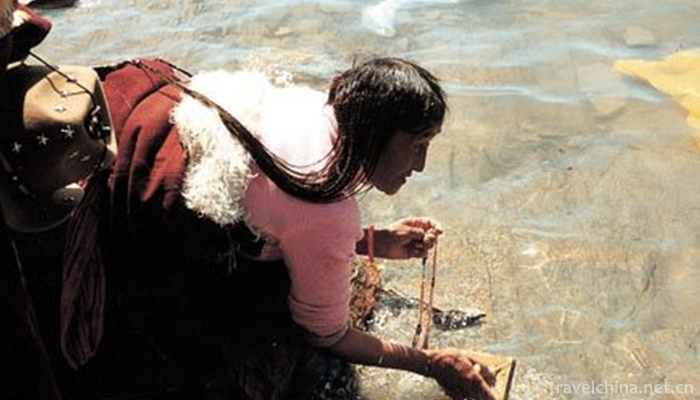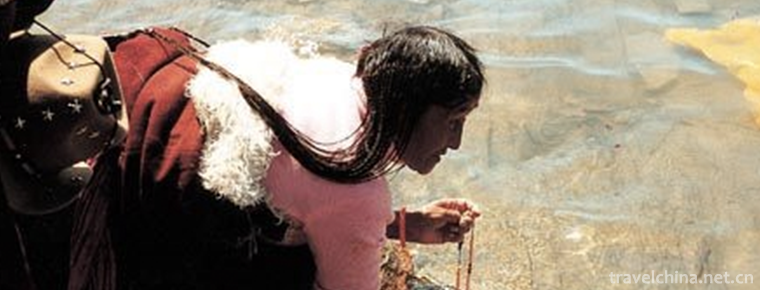Qinghai Lake offering sacrifices to the sea
Qinghai Lake offering sacrifices to the sea
Qinghai Lake is a pearl on the plateau of the mangyang snow area, which has been admired by people for thousands of years. This paper systematically expounds the origin, course, ritual rules and contemporary evolution of the sacrifice to the sea in Qinghai Lake, and tries to explore the historical evolution of the phenomenon of sacrifice to the sea. Qinghai Lake offering sacrifices to the sea is not only a folk custom activity with strong religious color, but also a cultural phenomenon, which contains many folk customs, and also expresses people's desire for harmonious coexistence with nature.
On June 14, 2008, the Qinghai Lake Sacrifice to the Sea declared by Haibei of Qinghai Province was approved by the State Council to be included in the second batch of national intangible cultural heritage list (category: folklore; number: _-86).
historical origin
The activities of offering sacrifices to the sea originated in Yongzheng period. In the second year of Yongzheng, General Nian Xiyao led the army to calm the rebellion of Qinghai Mongol leader Rob Zangdanjin, and to pursue the rebels to Qinghai Lake, the army began to run short of drinking water. At this time, a group of cavalry horses came from a distance. Several horses'hooves were stepping on the ground. The fresh water gushing out immediately solved the problem of drinking water for the army. The morale-boosting officers and men united to wipe out the rebels. After the Emperor Yongzheng heard about it, the imperial edict sealed the "Spiritual Revelation of Qinghai Lake", emperor granted the throne, placed it in the sea temple of Qinghai, and ordered regular sea worship in August every year (July 15 of the lunar calendar). Since then, large-scale sea worship activities began.
The sacrifice to the sea is the sacrifice to Qinghai Lake, which was originally a Mongolian tradition. Originally, the Mongolians who believed in Shamanism believed that all things were spiritual, especially that heaven was the Supreme god. In the Yuan Dynasty, the Mongolian people had the custom of offering sacrifices to heaven, mountains and seas. Since the Qing Dynasty, the sacrificial activities of Qinghai Lake have become more large-scale and religious. At the same time, Tibetans around the lake also took part in the sacrificial ceremony.
Nowadays, the ceremony of offering sacrifices to the sea in Qinghai Lake has been totally Tibetan. For Tibetan compatriots, offering sacrifices to the sea in Qinghai Lake is a very sacred thing, just like turning the year of horse into the sacred mountain and the year of sheep into the sacred lake. And large-scale sea worship ceremony once or twice a year, if you can catch up with the sea worship ceremony presided over by the eight living Buddhas on the edge of Qinghai Lake, that is the lucky life of Sansheng.
Activity content
Aquarius is one of the eight treasures in Tibet and an indispensable sacrificial object in the ceremony of offering sacrifices to the sea. The vase contains barley, wheat, pea, corn and broad beans. Coral, honeywax, agate and other grains are ground into flour and mixed into the vase. Finally, the vase is put into the Jingpai, which is then tied by the Living Buddha. In the ceremony of offering sacrifices to the sea, the people put the vase bearing their wishes into Qinghai Lake to pray for the realization of their wishes.
Along the 999-meter-long wooden trestle road to the sacrificial platform, more and more Tibetans are holding vases made of cereals in their hands. They stood on the altar, rounded their arms, threw the vase into the Qinghai Lake, and sent out their wishes.
In the rippling Qinghai Lake, ecological treasure bottles float on the water, which not only allows Tibetan people to pray for national security, the prosperity of human and animal, and the prosperity of grain, but also is their intention to protect Shenhu Lake.
Inheritance Significance
In 2008, it was selected as the second batch of national intangible cultural heritage list approved by the Ministry of Culture by the State Council. Qinghai Lake is the "holy lake" in the hearts of the Tibetan people living here. Every year, the local Tibetan people come to the lake in groups to "sacrifice to the sea" in their own way, in order to pray for national peace, prosperity of people and livestock, and prosperity of grain.


-
1.Ashatu Stonehenge Tourist Area Chifeng City Inner Mongolia Autonomous Region
Ashatu Stonehenge Tourist Area, Chifeng City, Inner Mongolia Autonomous Region Keshkten Stone Matrix (formerly Ashatu Stone Forest) is located in Keshkten Banner of Chifeng City
Time 2018-12-02 -
2.Mount Maoshan
Maoshan is located in Jurong City, Zhenjiang City, Jiangsu Province. It is about 10 kilometers long from north to south, 5 kilometers wide from east to west, and covers an area of more than 50 square
Time 2018-12-06 -
3.Pavilion of Prince TengTengwang pavilion
Tengwang Pavilion, one of the three famous buildings in the south of the Yangtze River, is located on the East Bank of Ganjiang River along the Yangtze River Road in the northwest of Nanchang City, Ji
Time 2018-12-08 -
4.Yilong Water Custom Park
Yilong Water Custom Park was built in 1996, covering an area of 100 hectares. It was solely operated by individuals and formally opened in June 1997.
Time 2018-12-22 -
5.Baoxiangsi Scenic Area
Baoxiang Temple scenic spot is located in the northwest corner of Wenshang County. It is a famous Buddhist cultural tourist resort in China. Baoxiang Temple scenic spot is a national AAAA level scenic
Time 2019-01-02 -
6.Buyi Folk Songs
Bouyei folk songs have special features, such as ancient songs, narrative songs, love songs, wine songs and labor songs; solo, duet, chorus and duet in form; tunes are divided into major and minor. Ev
Time 2019-04-04 -
7.Dan GA harmonics
Jia Hao, which means "grand singing and dancing performance" in Chinese, is a kind of collective dance, usually performed in the Tibetan New Year and major festivals every year. Men
Time 2019-04-25 -
8.Legend of Liu Ruan
The legend of Liu Ruan, also known as the story of Liu Ruan's encounter with immortals, is spread in Shangxian (now Xinchang, Shengzhou) and Tiantai. It is a mythological love story that takes Liu Rua
Time 2019-05-13 -
9.Pingyao Pushing Lacquerware Decoration Techniques
Pingyao polishing lacquerware decoration technology originated in Pingyao County, central Shanxi Province, and spread to the vast northern region. Lacquerware made with this technique has been well kn
Time 2019-06-09 -
10.Legend of Qu Yuan
The legend of Quyuan is one of the local folklores in Zigui County, Hubei Province. The people of Zigui created and inherited folk literature with lyric and expressive expression by linking Quyuan wit
Time 2019-06-11 -
11.Sichuan Yangqin
Sichuan Yangqin is one of the representative folk songs of Sichuan Province, which is popular in Chengdu, Chongqing, Luzhou, Zigong and other cities and regions. In the early period, it was also calle
Time 2019-06-16 -
12.Luzhou cuisine
Sichuan hotpot, famous for its hemp, spicy, fresh and fragrant, is the representative of Sichuan cuisine. It is said that the birthplace of Sichuan hotpot is xiaomitan in Luzhou (near Gaoba, Luohan street, Longmatan District).
Time 2020-12-14